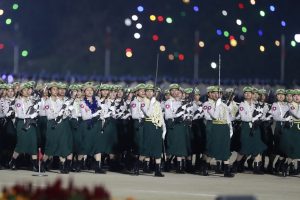Five months after the Myanmar military announced mandatory military service, women between the ages of 18 and 27 are now being enlisted. Though women were initially exempt from the draft, pregnant women and young mothers are now among those being added to registration lists by junta-appointed administrators across the country.
The gendered impacts of forced conscription of young women and girls are consequential and pose severe risks to their safety, especially given the junta’s long history of misogyny and violence. While there was speculation that women would not be forced to serve on the frontlines, it’s likely the junta will not hesitate to use them as human shields and force them to carry out duties that could put their lives in danger.
Additionally, women and girls are at a high risk of being sexually assaulted and raped while in the military’s custody. Domestically, there are no existing pathways to justice that would permit them to seek accountability. In addition, the 2008 military-drafted constitution ensures control over its judicial processes, which lack any civilian oversight. All of the judges are appointed by the military junta, and its soldiers are overwhelmingly protected, thus allowing further impunity.
Since the attempted coup of February 2021, the deterioration of women’s rights has been exacerbated by a broken justice system and an increase in cases of violence against women, particularly in ethnic areas. Women-led civil society groups, including the Karenni National Women’s Organization, the Kayan Women’s Organization, and the Burmese Women’s Union have all reported a rise in attacks against women perpetrated by the junta. Female political prisoners also face extreme levels of persecution and abuse in detention.
Further, women have accounted for one in five deaths, with over 1,000 killed since the 2021 coup, according to the Assistance Association for Political Prisoners. A 2024 Human Rights Watch report on Myanmar found an “uptick in reports of sexual violence and other forms of gendered harassment.”
On this year’s International Women’s Day, eight Myanmar women’s organizations condemned the announcement of the military’s forced conscription law. For women in particular, the joint statement expressed specific concern over the risk of forcibly enlisted women being subjected to gender-based violence, exploitation, and discrimination.
They noted that the military’s decades of widespread and systematic violations against women speak to the culture of impunity that will indeed continue in its armed forces, stating: “Women who will be forcibly recruited will be exposed to rape, gang rape, sexual slavery and other brutal forms of sexual violence, as well as conflict-related sexual violence, that the military has long perpetrated.”
The heightened risks they now face are forcing thousands of women to flee the country, which comes with its own set of risks. With very few options available, women are relying on dangerous options to flee the country. This puts them at increased risk of human trafficking and other forms of exploitation. Families seeking protection for their daughters involve brokers or agents who could further endanger them through profit-driven schemes. The LGBTQ community faces similar risks, including being trafficked into forced labor and sexual discrimination and exploitation.
In response to the conscription drive, women’s organizations continue to fill gaps in social services and political actions, including human rights awareness sessions, advocacy and actions on political resistance and ensure the safe and secure delivery of menstrual and nutritional kits for women and children.
Despite the increasing risks to their safety and funding limitations, they carry on this work to ensure vulnerable and displaced women and children receive support that upholds their dignity. The international community should stand with those opposing conscription. Civilians should not have to fight for a terrorist junta of war criminals and one that has been responsible for tearing their families apart.
Even though there is no formal treaty between Myanmar and Thailand regarding refugees, Thailand has accommodated refugees along the border for decades. Thailand must act compassionately and in a gender-sensitive manner to build meaningful relationships with grassroots leaders and organizations that uphold vulnerable groups’ safety, dignity and protection. Other neighboring countries, such as India and China, must also offer safe and reliable pathways of asylum for those seeking alternative education and work opportunities.
There must also be direct and flexible support for ethnic and women’s organizations that provide life-saving emergency support, including responses to domestic violence and gender-based violence to displaced populations and vulnerable groups in Thailand and along the border. Further, international stakeholders must acknowledge that the junta is neither a legitimate government nor a representative of the people. Therefore, they must engage with the National Unity Government and its allied ethnic revolutionary and resistance organizations rather than risk legitimizing the murderous coup regime.
Coup leader Min Aung Hlaing and his terrorist brand of soldiers must be held accountable for their ongoing crimes against civilians. The forced conscription mandate is only the latest scheme in their desperate quest for control. Women have come too far and have made substantial progress across the country. However, the mandatory draft risks further setbacks for women’s rights. Over the last three years, women have taken on advanced leadership positions nationwide. We continue to call for greater gender equality as a strength and pillar of the revolutionary movement.

































